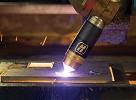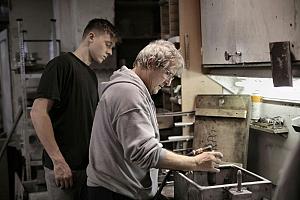- FMA
- The Fabricator
- FABTECH
- Canadian Metalworking
Commentary: Training gaps frustrate small to mid-sized shops
At the CMTS Automotive summit last fall, the person who made the most impact in the room wasn’t on the panel of speakers. It was Glenn Healey, Plant Manager at Collison-Goll Ltd., who raised an issue that was on the minds of many shop owners – it’s great to talk about innovation and automation, but how do you upgrade the skills on your shop floor when there aren’t programs to support those upgrades?
- February 6, 2012
- News Release
- Fabricating
This is not easy for smaller shops that don’t have expansive training budgets. Healey has been trying to find a solution for a number of years now, and he explained the situation in more detail to me a few weeks after the show. “We run a shop of around 50 people, so training is a big concern for us,” he says. “When we started to migrate to more sophisticated CNC machines, that training became even more important, and we couldn’t provide it in-house. But I was determined to find a way. I met with an Associate Dean from one of the local colleges in Toronto and we discussed programs geared towards upgrading the skills of our current employees. Unfortunately, everything offered at the school was geared more specifically to new recruits entering the workforce for the first time. “To help the college understand what we needed, we held one of our monthly industry association meetings at the college,” he continues. “From that meeting, there seemed to be an interest from the college to engage with us and develop a program with industry to suit our needs. We created a committee with industry professionals, college personnel – even an Industrial Technology Advisor from the National Research Council’s Industrial Research Advisory Program. “But after three years of planning aimed at filling classroom seats and providing industry with training that was better suited to their needs, we hadn’t gotten any further. The college ended up closing some of its labs and sold some of its equipment saying that there just wasn’t enough interest. “The college claimed that declining enrolment was due to parents and guidance counselors steering students away from manufacturing, saying it was a dead or dying industry. I was quite prepared to educate high school guidance counselors and others about why this wasn’t true, and we considered adding them to our advisory committee, but by then it was too late.” Healey wasn’t about to throw in the towel, however. He tried to create training sessions for like-minded small shops. “I told other companies that I had a trainer we could bring in, who would work to our hours, and we could pool our resources, split the costs and run the sessions at one of our shops – our shop or someone else’s, it didn’t matter to me. We are good competitors, I didn’t think this would be an issue. But no one wanted to do it.” The type of training Healey is looking for is a program that would give his mature employees a more thorough understanding of what CNC machines are capable of. “Some members of our team might have 10 years of experience, but because they’ve never had formal training, they don’t have as much flexibility in their work practices,” Healey explains. “For instance, when I ask one team member a question, he might say, ‘yeah, I know how to do that, I always do it this way.’ But when I ask him why he does it that way, he doesn’t have an answer – just ‘it works.’ I want them to have the knowledge to take whatever they are doing a few steps further.” Healey’s son, a mechanical engineer, has come on board at his plant and is doing a fair amount of one-on-one training with his team members, but Healey knows that this isn’t the solution industry needs. “We need more night courses available for all industry,” he says. “If it could be organized to serve a large group of companies, the cost wouldn’t be prohibitive.” Although machine tool builders do training sessions, it’s generally for newly purchased equipment. But Healey takes advantage of any program he can. For instance, he has made use of Sandvik Coromant’s professional training facility, and has sent a number of employees to a variety of classes at other colleges. He is also working at arranging special classes designed for his company’s CNC department. Healey is also interested in getting keen students into his plant and keeping them there. He currently has a number of young, enthusiastic employees. “The challenge is we have to be able to offer them the opportunity to upgrade their skills, they need to have somewhere to go,” he explains. “They are willing to stay – they want to commit but they need to have the commitment from us. We’re trying, but it’s not as easy as I’d like.” As Healey puts it, when it comes to education, “we’re long on talk and short on action. Staying competitive requires that we have these skills, so we need to work with the more proactive machine and tool suppliers and continue to do our own training until the schools and government take a more serious look at relevant training.” We welcome your comments here at metalworkingcanada.com. Please leave a comment here, or email your comments to the editor, Robert Colman, at rcolman@annexweb.com.
subscribe now


Keep up to date with the latest news, events, and technology for all things metal from our pair of monthly magazines written specifically for Canadian manufacturers!
Start Your Free Subscription- Trending Articles
Orbital tube welding webinar to be held April 23

Portable system becomes hot tech in heat treatment

Cidan Machinery Metal Expo 2024 to be held in Georgia May 1-2

CWB Group launches full-cycle assessment and training program

Achieving success with mechanized plasma cutting

- Industry Events
MME Winnipeg
- April 30, 2024
- Winnipeg, ON Canada
CTMA Economic Uncertainty: Helping You Navigate Windsor Seminar
- April 30, 2024
- Windsor, ON Canada
CTMA Economic Uncertainty: Helping You Navigate Kitchener Seminar
- May 2, 2024
- Kitchener, ON Canada
Automate 2024
- May 6 - 9, 2024
- Chicago, IL
ANCA Open House
- May 7 - 8, 2024
- Wixom, MI














